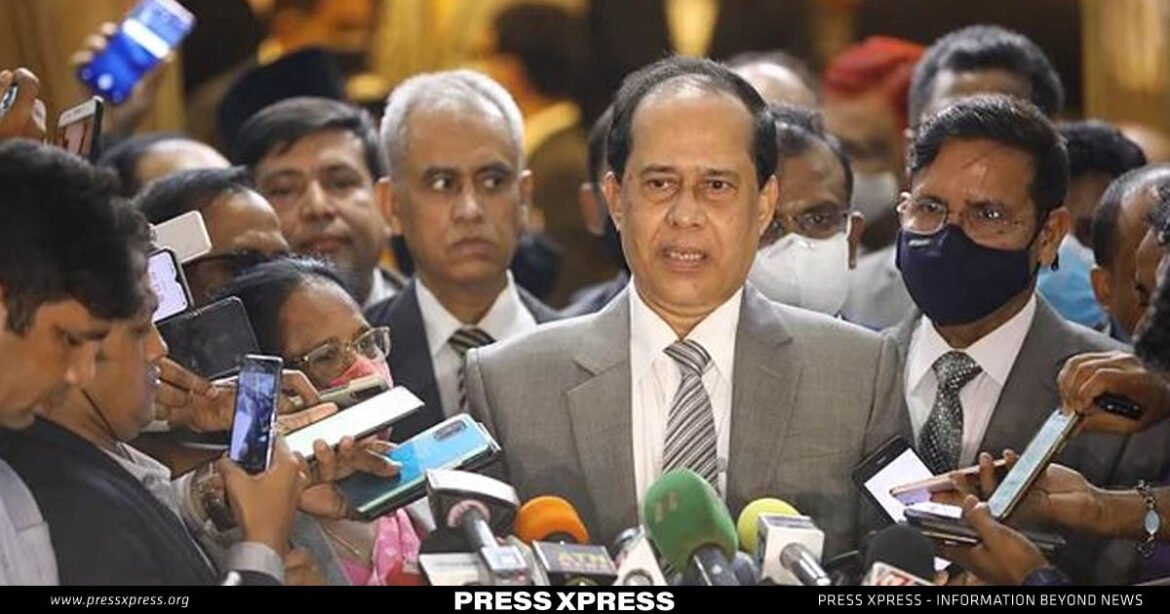“Our aim is to confront the challenge of conducting the forthcoming national elections with complete freedom and impartiality.”
– CEC Kazi Habibul Awal
Desiring to embrace the responsibility of ensuring credible elections, CEC Habibul Awal of Bangladesh expressed his commitment during the inauguration of a training workshop for Upazila Nirbahi Officers (UNOs) and Upazila Election Officers in preparation for the 11th National Assembly elections on October 1.
CEC Awal emphasized, “Our aim is to confront the challenge of conducting the forthcoming national elections with complete freedom and impartiality.” He acknowledged the prevalent public perception of mistrust in the government’s ability to ensure fair and unbiased elections, adding, “We are determined to confront this challenge and strive for an election that is characterized by freedom, fairness, tranquility, and transparency.”
Awal highlighted their plans to achieve transparency in the electoral process through vigilant monitoring and media oversight. He urged the participating officers to actively contribute to this objective to ensure that the upcoming elections inspire confidence among the populace.
CEC Acknowledges Influence
Chief Election Commissioner (CEC) Kazi Habibul Awal acknowledged that he is exerting influence on the existing Election Commission because of the disputes surrounding the 2014 and 2018 elections. However, despite this, the present Election Commission is determined to confront the task of orchestrating credible elections.
In response to CEC’s remarks, election experts assert that a political consensus is imperative to shield the Election Commission from such pressures. Without unanimity among political parties on the electoral governance system that ensures free, equitable, participatory, and widely accepted elections, it becomes challenging for the EC to fulfill its responsibilities without external pressures.
Experts Stress the Need for Political Consensus
When queried about resolving the challenges confronting the current commission stemming from controversies surrounding the last two national elections, Dr. Badiul Alam Majumdar, the Secretary for Good Governance, commented, “The experiences of the preceding two elections conducted under a party government have been far from satisfactory. Extensive debates have arisen both domestically and internationally regarding these elections. Opposition political parties remain ensnared in suspicion and mistrust. Consequently, the Election Commission finds itself burdened by a crisis of confidence. Thus, the foremost requirement is a political decision to alleviate the pressure on the EC. Achieving free, fair, participatory, and widely accepted elections hinges on political parties reaching a consensus on electoral governance. If there is an agreement on a non-partisan government arrangement during elections, the Election Commission will be relieved of such pressures.”
Credibility Challenge
During the commencement of the training for Upazila Executive Officers and Upazila/Police Station Election Officials for the twelfth election, Chief Election Commissioner Kazi Habibul Awal expressed, “The burden of controversy from the past two elections looms over us. What sets the forthcoming elections apart is the elevated volume of grievances. The challenge we face with this election is fundamentally a crisis of trust. Therefore, our responsibility is of utmost significance. We are determined to confront the challenge of conducting elections that are genuinely free, impartial, and fair.”
CEC’s Directions
The CEC remarked, “There is a prevailing sentiment that trust is lacking in both the EC and the government.” To prevent the emergence of a crisis of confidence in future elections, the relevant officials have received instructions to exercise vigilance in carrying out their duties.
Kazi Habibul Awal added, “Criticism and debates about elections are not uncommon. Such discussions have transpired in the past, even during the British colonial era.”
Addressing the officials, the CEC emphasized, “The term ‘credible’ holds significance, not only within our country’s legal framework but also within the legal systems of all nations, including international agreements like the ICCPR and the Universal Declaration of Human Rights. This term also resonates in the realm of democracy, where elections must be deemed credible. Credibility can only be achieved when we uphold transparency in the execution of our responsibilities.”
The CEC stated, “All of us involved in the election process, from election officers to everyone present here, must dutifully shoulder our responsibilities in accordance with the RPO (Representation of the People Order). If any questions or concerns arise, do not hesitate to raise them. Adherence to our duties is of utmost importance. The Election Commission (EC) will also closely monitor your activities through various means.”
Regarding the campaign, the CEC emphasized, “The EC will rigorously combat any misinformation circulating in the media related to the National Assembly elections.” He elaborated, “There is a substantial amount of misleading information in the media presently, which falls under the categories of misinformation or disinformation. We will take stringent measures to counter these in order to prevent any adverse impact on the elections.”
Conclusion
Chief Election Commissioner (CEC) Kazi Habibul Awal, in the midst of controversy surrounding previous elections, is determined to ensure the credibility of upcoming elections. He emphasized the need for transparency and vigilance, acknowledging the crisis of trust in both the Election Commission and the government. Experts underscored the importance of political consensus to shield the EC from undue pressures. Dr. Badiul Alam Majumdar, the Secretary for Good Governance, emphasized the need for a non-partisan government arrangement during elections to alleviate pressure on the EC. CEC Awal’s commitment to credible elections and the rigorous efforts to combat misinformation in the media signal a dedication to ensuring the integrity of the electoral process.


